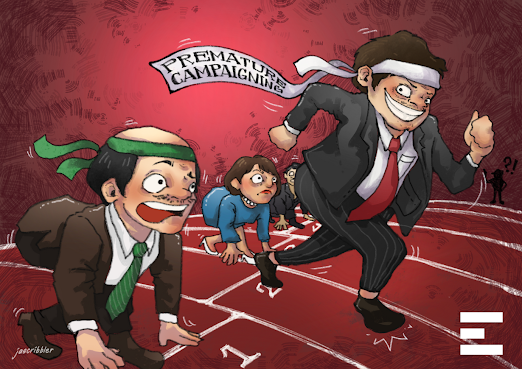Breaking Patronage | Premature campaigning is problematic
Kristian Timothy Bautista
As the 2025 midterm elections come close, the Commission on Elections (Comelec) stands firm on strictly prohibiting premature campaigning in the 2025 midterm elections. However, as an everyday commuter, it puzzles me to see the number of tarpaulins, posters, and billboards of aspiring or incumbent politicians plastered all over the streets on my way to school.
A simple scroll on social media would lead me to another Facebook advertisement sponsored by a well-known politician running for reelection. These blatant displays call into question the integrity of the election law and expose the loopholes that allow candidates to sidestep its intended purpose.
While Comelec states that premature campaigning rules will immediately apply to politicians once they file their certificates of candidacy for the midterm elections, an elective aspirant is only considered a “candidate” once the official campaign period starts, according to the landmark Supreme Court ruling on Lanot vs Comelec in 2009.
This amendment has practically nullified the essence of a premature campaigning policy since the campaign period for national and local candidates starts 90 and 45 days before election day, respectively.
In retrospect, all candidates who have filed their candidacy in early October 2024 can bypass the prohibition of premature campaigning as there is no official candidate until the campaign period starts. With the campaign period starting only in February 2025, all aspiring candidates have a four-month window to presumably engage in “early campaigning” without facing an election offense, which forms a legal loophole regarding the policy on premature campaigning.
As far as the law or policies for premature campaigning go, nothing much has been said for candidates who have been displaying their tarpaulins as early as now, and those who question the current policy are allowed to go to the Supreme Court to do so according to Comelec chairman George Erwin Garcia. This statement may only constitute that our legislators have been doing nil to address the growing frustration and systemic problem that favors those in power.
The legal loophole on premature campaigning may branch out to many issues that are unfair and unjust. While every candidate could go to town and campaign by plastering their faces on tarpaulins as early as now in a legal manner, one could only make such an effort by having the resources to do so. With “early campaigning” dubbed as a legal action, candidates do not need to worry about maximizing the budget cap on campaign resources since the campaigning period has not officially commenced.
Alongside maximizing budget cap, early campaigning has been a pattern that many Filipinos may see on incumbent officials, which brings the issue of current officials potentially using their offices’ budget for campaigning purposes.
However, while this issue may be watered down as a mere speculation, it is still apparent that an incumbent official running for reelection likely focuses on campaigning for the next election if that is their intention, which may cause them to lose focus on their supposed responsibilities as a politician.
Ultimately, our statutes are already malleable, and our election policies affirm that as it has seemingly evolved in favor of those who know how to exploit the law, eventually wield power and tarnish the country’s democratic process. This is how political dynasties have come to light where only a handful of political families have governed the country—which should be apprehended and amended by the Filipino people as it disrespects our democratic processes.
Alongside challenging the status quo and the election law, the systemic problem also sheds light on a proactive shift in action—starting with the youth. With the current OCTA Research survey showing the list of senatorial bets consisting of known personalities vying for reelection or even family members of known politicians, the long journey to climb out of the rabbit hole seems to be getting longer than ever.
But the future isn’t set in stone. Now, more than ever, the youth must go all hands on deck, register to vote, and take a stand against misinformation, disinformation, and other pressing issues that seek to silence us like premature campaigning. Only through engaging in the political process can we challenge these broken systems and reclaim our voice in shaping the future.
While it looks like voting can no longer be the remedy as our government is tainted with those who ran in office for personal gain, staying neutral or not voting at all this coming election may only instigate the very forces we want to dismantle. Through collective efforts, we could demand leaders who prioritize public service over self-interest.

